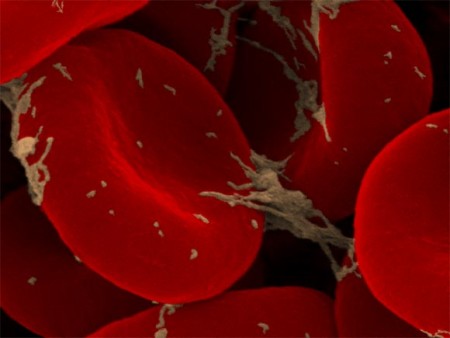December 10, 2015 – An 18-month-old company is developing drugs for tough diseases. The company is Rubius Therapeutics. Its trademarked treatment is Red-Cell Therapeutics. What the company is doing is engineering red blood cells with biotherapeutic properties.
Why red blood cells as a therapeutic delivery system? Because they have no nucleus red cells carry no genetic information which means the potential for an autoimmune response is dramatically lessened. According to Harvey Lodish, Professor of Biology and Bioengineering at Massachusetts Institute of Technology, red blood “spend as much as four months in circulation, providing an opportunity for long and tunable therapeutic treatments…..have profound effects on the immune system and may ultimately transform the way we treat autoimmune diseases and allergies.”
The first disease on the radar is phenylketonuria, known by the acronym PKU. Approximately 1 in 15 to 25,000 babies in the United States is born with PKU. It most commonly occurs in people of North European or Native North American descent. It is inherited and passed on when both parents have a mutated gene on chromosome 12. Those suffering from PKU cannot digest the amino acid phenylalanine hydroxylase found in high-protein foods. The amino acid builds up in the blood stream causing damage to the central nervous system and brain. Babies born in the United States are regularly screened for the disease through a blood test taken within a day or two of birth. The disease leads to developmental delay, depression, psychosis and other mental disorders. Up until now treatment has largely been limited to a highly restrictive diet with limited exposure to milk, eggs, cheese, nuts, chicken, beef, diet drinks and chocolate. The picture below includes many of the foods PKU sufferers cannot ingest.
Rubius is using stem cells to grow red blood cells with specific therapeutic proteins that can address diseases like PKU. The blood cells become a delivery system providing prolonged therapy that takes advantage of the longevity of the cells while traveling through the blood stream. An alternative such as injecting the protein directly into the bloodstream would result in it being cleared almost immediately and alerting the immune system to respond the next time the protein was introduced. Using the red blood cells it becomes treatment by stealth.
The Rubius Erythrocyte Design platform allows for rapid prototyping of genetically engineered red blood cells that can be equipped with appropriate proteins to address inheritable and autoimmune diseases. The company has targeted 50 rare diseases and plans to announce several new therapies in the coming months. So far the PKU treatment protocol is showing good results in animal studies. A human clinical trial is planned for 2016.











[…] Genetically Modified Red Blood Cells Are Being Used to Treat Disease […]